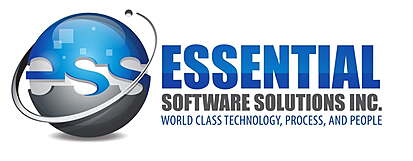Nine reasons to pick a cloud-based ERP system
Cloud computing is one of the driving forces for digital transformation in a range of industries. Manufacturing is no exception with cloud-based ERP systems becoming increasingly popular instead of on-premise system. Cloud ERP systems are flexible and faster, while legacy ERP systems are rigid and struggle to keep up with technological innovations and industry practices. In 2018 cloud-based ERP systems had a 20.7% enterprise application growth rate in the public cloud and this number has been steadily rising.
However, many organizations are still figuring out of if a cloud-based ERP is the right fit for them. Misconceptions about the cost, security and implementation challenges of cloud-based ERPs can give companies doubts about making the shift to a cloud ERP.
To make the choice easier for you, here are 9 reasons to pick a cloud-based ERP system.
1. Easy, Affordable Implementation
The biggest selling point of a cloud ERP system is the ease and affordability of implementation. With a cloud system, there is no need to invest in expensive hardware and infrastructure that an on-premise system would require. Lower up-front costs and a licensing fee structure due to the cloud ERP’s Software as a Service (SaaS) model make it a highly affordable option. Ongoing operational costs are also lower – you don’t need to pay for employees to perform maintenance, your vendor takes care of maintenance and updates. Choosing a cloud ERP is cost-effective and won’t use up your entire budget. These savings can be put to better use for your business.
2. Rapid Deployment & ROI
Realizing the benefits of a cloud ERP can be as quick as a month. It can be implemented within 72 hours and you can leverage several in-built best practices. This can minimize the time and effort spent on system customizations. Faster deployment is good for your business as there is no downtime. Thanks to rapid deployment, you won’t need to run both the legacy system and the cloud ERP side by side for a long time frame which can be expensive. Once your cloud ERP is up and running, you’ll see ROI from operational improvements quickly.
3. Leverage Scalability
A major advantage of cloud architecture is the ability to scale on-demand. In case you require greater computing power at specific times of the year, or if your business is expanding, a cloud ERP can easily scale to your requirements. Scale up or down as required, without the hassle of having to re-implement every time a change is needed. Ease of scalability gives your business the technological backbone to support growth and whatever changes this entails – new vendor relationships to manage, handling new customer issues, timely reports on finances and operations, and so on.
4. Streamline Infrastructure & Boost Productivity
Modern, cloud-based ERP systems help streamline infrastructure and processes by digitizing data. No more spreadsheets and manual data entry – with a cloud-based ERP, you gain a powerful, centralized database. This single source of truth streamlines processes and gives everyone access to the latest information. This centralized data and the automation capabilities of a cloud ERP boost productivity exponentially. Employees can focus on higher-value business activities ranging such as improving customer-facing operations and enhancing vendor relationships.
5. Work from Anywhere
Giving your workforce the advantage of staying mobile and the ability to work from anywhere is a major advantage of a cloud-based ERP. Sales roles and other service staff need a remotely accessible ERP. Even customers and vendors expect individual access to enterprise information. Staff deployed onsite require a means by which they can stay connected with each other and the latest, updated information. With a cloud-based ERP all this is possible – they simply need is a device with an internet connection.
6. Keep Up with ERP Innovations
You can stay on par with competitors who are also making the shift to a cloud infrastructure by utilizing the best practices that come built in with cloud ERPs. The cloud ERP vendor handles updates, so you will automatically upgrade to the latest innovations without the stress of implementing the update yourself. Updates can be made with full visibility and zero disruption and are usually announced in advance. A vendor that provides training on these updates helps your team keep up with the latest ERP innovations.
7. Ensure High-level Security
The thought of losing control when making the shift to a cloud-based ERP sometimes deters companies as the information stored in your ERP is critical to your business. However, cloud ERP systems are very secure and typically have stronger security than a business can afford in-house. This is especially valuable with global employees who connect through a VPN. Vendors are accountable to several customers who have their data on the cloud, so they ensure the latest, highest-level security measures to safeguard security. Your vendor will ensure that security is up to date with a holistic approach that anticipates threats ahead of time and minimizes disruptions. Cloud-based ERPs provide year-round security, twenty-four hours a day.
8. Empower Your IT Department
With a legacy, on-premise ERP system, the IT department spends a lot of time on simply maintaining and overseeing the system. Shifting to a cloud-based ERP does not render your IT team obsolete. On the contrary, it automates the majority of mundane, routine tasks, so your IT staff has the opportunity to engage in more value-added tasks that align with business strategy. This can serve to boost ROI in the long run.
9. Enjoy a Competitive Edge
Having a cloud-based ERP system for your business can help you perform at an enhanced level in comparison to businesses with legacy ERP systems. Increased productivity, a single source of truth with the latest information that enables collaboration, and minimal down time allow you to conduct business faster. Powerful automation minimizes error-prone, manual effort and improves processes with industry best practices built into the cloud ERP. Improve customer and employee experiences with a cloud ERP for a greater competitive edge.
If you’d would like to realize the benefits of a cloud ERP for your organization, we would be glad to help. Essential Software Solutions Inc. has Industry 4.0, ERP and Cloud expertise and over4 decades of experience supporting businesses across Canada in expanding market share and boosting revenue. Our CloudSuite Industrial ERP turns the complexities manufacturers and distributors face into opportunities that outshine the competition. Reach out to our team at ESS to find out more.
#ESSoftware #SaaSERP #ERP #CloudERP #CloudbasedERP #CloudCompting











